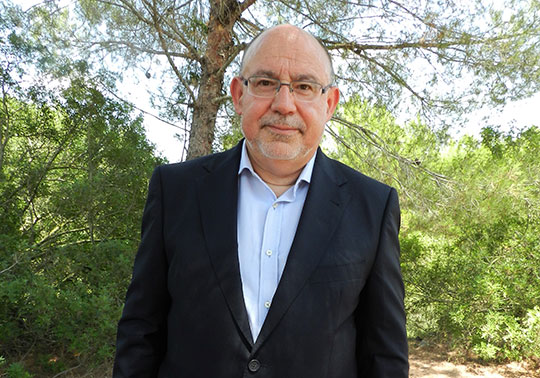
On the first anniversary of the CASwaterLAB project, the director of the Chair for Transformation of the Economic Model: Circular Economy in the Water Sector of the Valencian Government and the Universitat de València (GVA-UV), Francesc Hernández, takes stock.
He considers "very positive" the consortium created together with the Research Institute of Water and Environmental Engineering (IIAMA-UPV) and the Institute for Ceramic Technology (ITC-AICE) which, with funding from the Valencian Innovation Agency (AVI), will culminate in the creation of a Living Lab, or real test laboratory, in the field of water in the province of Castellón. The objective: innovate in the reuse of wastewater, generate alternative water resources and optimise existing ones.
Question: In a context in which drought is gaining ground, you are committed to water reuse as an alternative. Is the Administration a good ally in this objective?
Answer: The role of the administration is fundamental. It must transmit confidence and offer guarantees through regulation so that water reuse becomes another example within the logic of the circular economy.
Question: And what does the business sector need in order to take action and reuse water in its production processes?
Answer: It needs to be offered guarantees that the use of reclaimed water is reliable and that its cost is perfectly acceptable. This could be achieved through a new regulatory framework for reuse coupled with an ambitious incentive programme that would make the use of reclaimed water attractive at a cost that cannot be much higher than that of conventional water.
Question: How does water scarcity affect companies and society in general in Castellón?
Answer: At present there are no serious water shortage problems in this area. This means that there is some scope for preventive measures in this area. The relentless influence of climate change will mean that we will not be able to cover all our needs with conventional water resources. The commitment to reuse should be made in the short term, but without hasty decisions.
Question: Does Castellón have the potential to reuse water?
Answer: Yes, of course. Its water reuse potential is very high as it will mean converting the province's current WWTPs into new water sources. These new resources will help to face the influence of climate change and contribute to the sustainability of water resources in Castellón.
Question: More specifically, what can you tell us about the work that the GVA-UV Chair has carried out so far on the project?
Answer: Together with IIAMA and ITC, we have carried out various interviews with all the agents involved in water management in the province of Castellón and various materials have been produced that will contribute to the dissemination of the importance of reuse.
Question: How do you assess the interviews carried out with the agents in the water sector?
Answer: Positively, in fact, we are convinced that with the valuable contributions of all the agents, the barriers that prevent the consolidation of a circular economy model in the water sector will be eliminated.
Question: What will be the next actions of the GVA-UV Chair in this Living Lab on water?
Answer :We are contributing to the design of a reliable and innovative strategy capable of implementing the principles of the circular economy in the field of water. We are going to continue with the work plan started last year promoting the participation of all actors in the water sector in order to design concrete plans and measures to overcome the existing barriers in the field of reuse.








